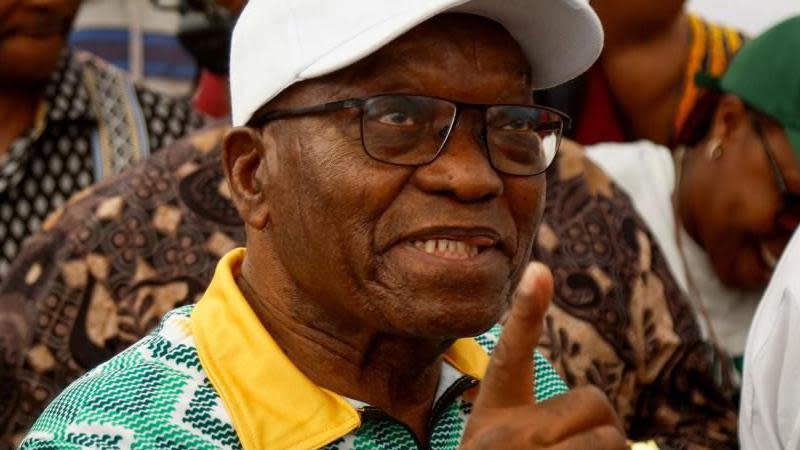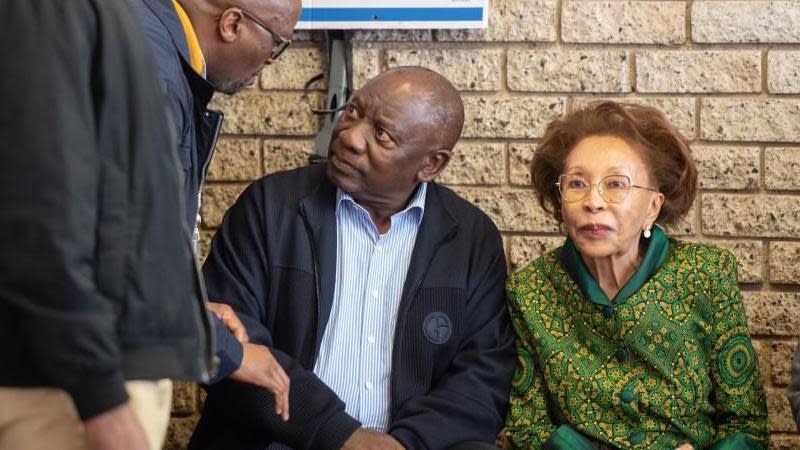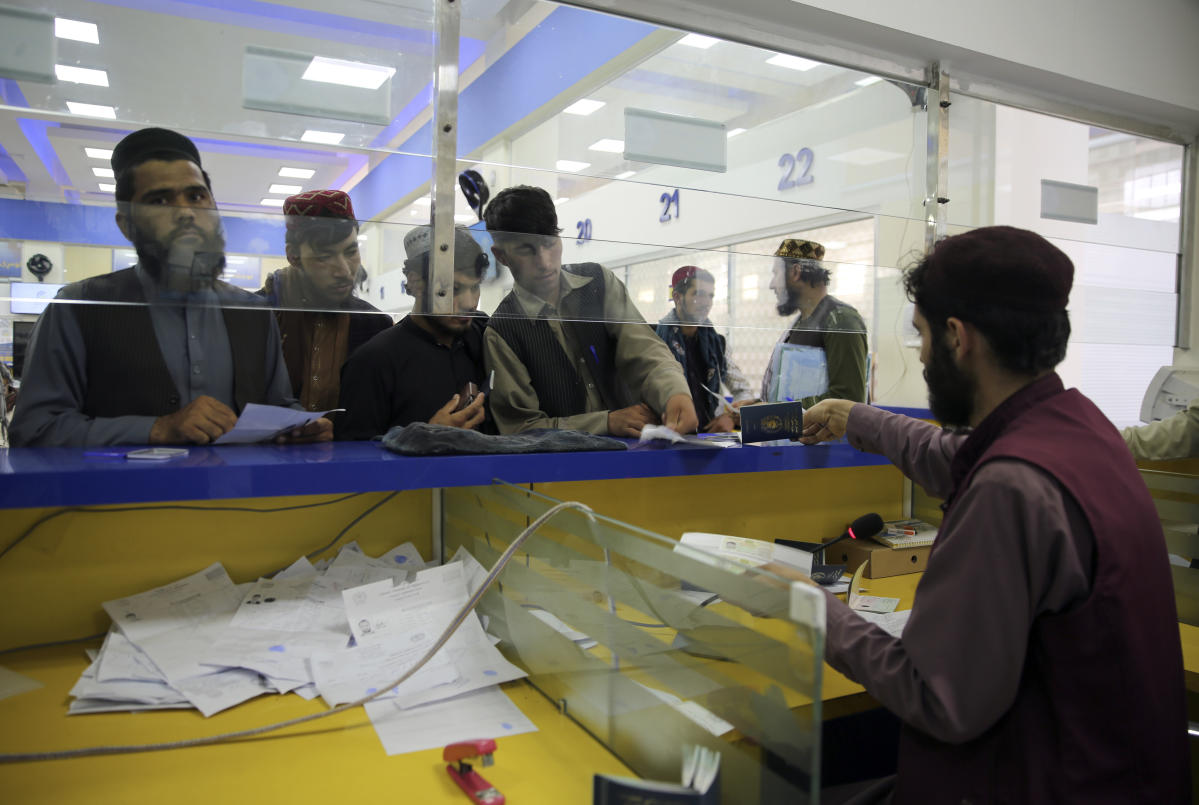South Africa’s ruling African National Congress (ANC) looks set to lose its parliamentary majority for the first time since Nelson Mandela led the country to victory after the end of the racist apartheid system in 1994.
It would mark the end of the party’s decades-long dominance in South African politics, raise questions about President Cyril Ramaphosa’s leadership and usher in an era of coalition politics.
Here are three factors that explain how South Africa got here, why and what the future holds.
1) Behind the free fall of the ANC
The ANC was once a respected liberation movement engraved in the hearts of South Africans, but after thirty years in power it has become synonymous with corruption and poor governance.
As a result, it was punished in Wednesday’s elections, especially by young people who turned out in large numbers to vote against the party – something they never did in previous elections.
“They are fed up with corruption and are hit hardest by unemployment. They have turned against the ANC,” said William Gumede, chairman of the nonprofit Democracy Works Foundation.
It marks a generational divide in South Africa: their parents are still loyal to the ANC because they lived through apartheid and know first-hand the ANC’s rich history as a liberation movement that freed black people from the shackles of the apartheid.
But support for the ANC among older voters has also declined, including in rural areas.
“The ANC lost support in the big cities a long time ago. Now it is also losing support in rural areas,” Professor Gumede told the BBC.
The ANC reached its electoral peak in 2004 when it won 70% of the vote. Since then, it has lost 3% or 4% support in every election, falling to 57% in the 2019 poll.
In these elections the drop in the number of votes appears to be enormous: from 8% to 15%.
2) Zuma’s return

South Africa’s former president Jacob Zuma, 82, is back.
He was ousted by the ANC in 2018 over corruption allegations, which he denied. He was succeeded by President Cyril Ramaphosa.
About three years later, he was sentenced to 15 months in prison for contempt after defying a court order to appear before a corruption investigation during his nine-year presidency.
President Ramaphosa released Mr Zuma after serving just three months of his sentence in an attempt to calm him and his angry supporters.
But he is likely to regret the decision as Zuma returns to the political frontline under the banner of a new party, uMkhonto we Sizwe (MK), or Spear of the Nation.
The results released so far suggest that the ANC has been particularly supportive of MK, which could take control of KwaZulu-Natal province.
If this is confirmed by the end result, it would make Mr Zuma the province’s political backer and give him a base from which to plot Mr Ramaphosa’s downfall – his main objective.
His conviction means he can no longer hold a seat in the National Assembly, but he can still pull the strings from behind the scenes.
MK’s growth has been extraordinary. It was only registered last September, when Mr Zuma announced in December that he would join it because he could not vote for a Ramaphosa-led ANC. It has since shaken up South African politics in a way that no new party has done in such a short period since the end of apartheid.
South African Mail & Guardian newspaper KwaZulu-Natal correspondent Paddy Harper said MK had eroded the support not only of the ANC but also of the radical Economic Freedom Fighters (EFF), the third largest party of South Africa to date.
Early results suggest MK is challenging for third place in the national parliament.
In KwaZulu-Natal, the EFF’s final vote could be in the single digits if current trends continue, despite the party starting its election campaign in the province in the hope of growing there, Mr Harper told the BBC.
The EFF and MK advocate similar economic policies, including the expropriation of white-owned land and the nationalization of key sectors of the economy.
But Mr Zuma won over EFF supporters in KwaZulu-Natal, his home province.
He infused his campaign with Zulu nationalism and evoked memories of the country’s founder, King Shaka, during his campaign.
The former president also pledged to expand the powers of all South African kings and leaders, who currently have ceremonial powers, and to help the government achieve development in rural areas where they exercise influence.
MK’s manifesto promised to “expropriate all land without compensation and transfer ownership to the people under the care of the state and traditional leaders.”
MK also campaigned on Zuma’s record in government, saying the economy has deteriorated under Ramaphosa.
MK supporters also criticize Mr Ramaphosa for imposing one of the world’s strictest lockdowns during the Covid pandemic, saying this has worsened poverty and unemployment.
3) The beginning of coalition politics


The respected South African Council for Scientific and Industrial Research (CSIR) and the website News24 predict that the ANC’s final vote could be around 42%.
If this proves to be the case, the outcome would be catastrophic for the ANC – and for Mr Ramaphosa.
He could come under pressure from the party to resign, with his deputy, Paul Mashatile, touted as a potential successor.
Mr Ramaphosa led the ANC to a lackluster election campaign, and the party became so desperate that it got former president Thabo Mbeki – as well as other retired party leaders – to join the campaign in a bid to boost its votes.
The president is widely seen as weak and indecisive. He has defended himself by saying his focus was on “social densification,” or consensus building.
“Those who want a president who is dictatorial, adventurous and reckless will not find that in me,” he said while campaigning.
Ramaphosa’s chances of staying in office will be better if the ANC gets between 45% and 50% of the final vote.
This is the outcome that many ANC members had accepted during the election campaign, saying the party could remain in power in coalition with smaller parties – such as the Inkatha Freedom Party (IFP), which draws its support mainly from ethnic Zulus in KwaZulu. -Natal, or the Islamic Al Jama-ah party.
But if the ANC falls below 45%, it will likely need a major party as a coalition partner.
This could be the EFF or the main opposition Democratic Alliance (DA), which advocates centre-right policies such as greater privatization and the abolition of the minimum wage, and the IFP.
The DA’s support appears to have increased during these elections, with the party regaining the votes of white people who supported a party on the right in the last election, and some black people who thought the party should be given a chance in the national government.
Any coalition agreement at a national level would be influenced by what happens in the provinces – especially in the most populous provinces of KwaZulu-Natal and Gauteng, where Johannesburg and Pretoria are located.
The ANC could offer the DA and the IFP a deal that would see the three parties govern jointly at the national level and in KwaZulu-Natal.
“The DA and IFP have kept that option open to keep the EFF and MK out of government,” Harper said.
The ANC’s other option is to try to form a coalition with the EFF in national government, as well as in Gauteng, where the ANC will also lose its outright majority.
ANC leaders in Gauteng, backed by Mashatile, are said to favor a coalition with the EFF.
Mr Malema, a former ANC youth leader, is apparently open to the idea.
On South African news site Daily Maverick earlier this month, journalist Ferial Haffajee wrote that the EFF leader – who was previously convicted of hate speech for singing the anti-apartheid song Shoot the Boer [a reference to white farmers] – was “more deliberate and less angry” during the election campaign, and at a town hall meeting in April he expressed the view that the EFF’s natural coalition partner is the ANC.
“Even if the business community and markets are spooked by an ANC-EFF coalition, its potential is clearly central to Malema’s strategy to reach the Union Buildings. [the seat of government],” wrote Ms. Haffajee.
“Part of the ANC supports a coalition with the EFF. At the same time, Ramaphosa’s supporters in the ANC believe that such a coalition will create an existential crisis for the culture of the old liberation movement,” she added.
So tough decisions lie ahead for the ANC after the elections as South Africa enters a new era in which the opposition has the power to make or break the government.




Go to BBCAfrica.com for more news from the African continent.
follow us on twitter @BBCAfricaon Facebook at BBC Africa or on Instagram at BBCAfrica







